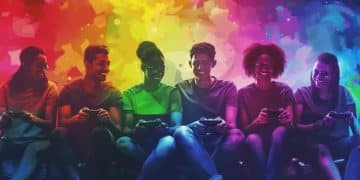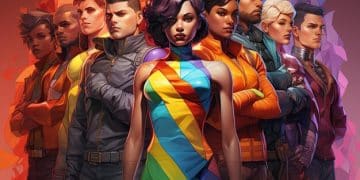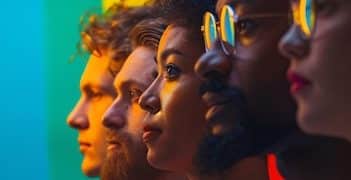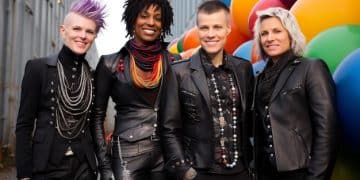Debunking LGBTQ+ Gamer Myths in League of Legends
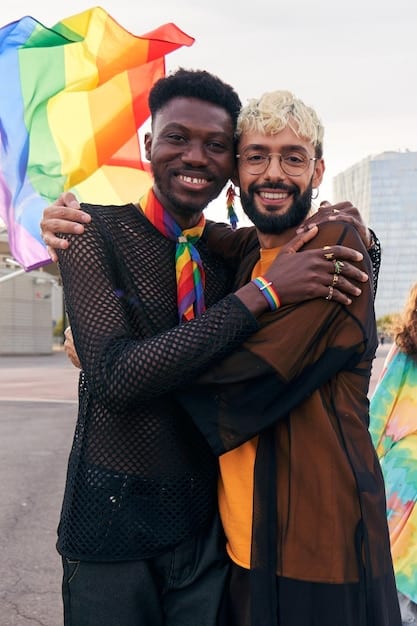
Debunking Myths and Stereotypes About LGBTQ+ Gamers in the League of Legends Community is crucial to foster inclusivity and understanding, challenging misconceptions and promoting a welcoming environment for all players.
The League of Legends community, like many gaming spaces, is home to a diverse range of players, including those who identify as LGBTQ+. However, misconceptions and stereotypes often cloud the reality of these players’ experiences. This article aims to set the record straight by debunking myths and stereotypes about LGBTQ+ gamers in the League of Legends community, fostering a more inclusive and understanding environment.
Understanding the LGBTQ+ Community in Gaming
The presence of LGBTQ+ individuals in gaming is not a new phenomenon, but it’s one that is becoming increasingly visible and recognized. Understanding the diverse identities and experiences within this community is essential for creating inclusive gaming environments.
The LGBTQ+ community encompasses a wide spectrum of sexual orientations and gender identities, each with its own unique history and challenges. In gaming, these individuals often seek spaces where they can express themselves freely and connect with others who share similar experiences.
Why Representation Matters
Representation of LGBTQ+ characters and narratives in games can have a profound impact on players who identify as LGBTQ+. It provides validation, fosters a sense of belonging, and challenges societal norms.
The Importance of Safe Spaces
Creating safe spaces for LGBTQ+ gamers is crucial. These spaces should be free from harassment, discrimination, and judgment, allowing individuals to express themselves without fear.
- Representation in games can boost self-esteem for LGBTQ+ players.
- Safe spaces online allow for authentic connections.
- Challenging stereotypes promotes understanding and acceptance.
- Allyship from non-LGBTQ+ players is vital for inclusivity.
By fostering understanding and acceptance, we can create a more inclusive gaming community where everyone feels welcome and valued. Recognizing the importance of representation and safe spaces is a step in the right direction.

Common Myths About LGBTQ+ Gamers
One of the first steps in fostering an inclusive environment is to address and debunk common myths surrounding LGBTQ+ gamers. These misconceptions often perpetuate harmful stereotypes and prevent genuine understanding.
These myths can range from assumptions about their playstyles to misrepresentations about their interests within the game. By examining and challenging these misconceptions, we can begin to dismantle the barriers that prevent LGBTQ+ gamers from feeling fully accepted.
Myth: LGBTQ+ Gamers Are All Support Players
This stereotype suggests that LGBTQ+ gamers predominantly play support roles in League of Legends. In reality, players choose roles based on personal preference and skill, regardless of their sexual orientation or gender identity.
Myth: LGBTQ+ Gamers Are Less Skilled
Skill in gaming is determined by practice, strategy, and teamwork, not by sexual orientation or gender identity. The notion that LGBTQ+ gamers are somehow less skilled is baseless and discriminatory.
- Gamers choose roles and styles by enjoyment, not orientation.
- Skills come from practice, not identity.
- Stereotypes can be hurtful and untrue.
By debunking these common myths, we can move towards a more informed and accepting view of LGBTQ+ gamers in the League of Legends community. Understanding that their identities do not dictate their gaming preferences or skills is a fundamental step.
Addressing Stereotypes in the League of Legends Community
Stereotypes can be particularly damaging because they perpetuate prejudice and marginalization. The League of Legends community is not immune to these issues, and it’s important to address the stereotypes that LGBTQ+ gamers often face.
These stereotypes not only misrepresent individuals but also create a hostile environment that discourages participation and expression. By identifying and actively challenging these stereotypes, we can work towards a more inclusive and welcoming community.
The “Gayming” Stereotype
The term “gayming,” used to suggest that there’s a specific “gay way” to play games, is dismissive and reductive. LGBTQ+ gamers engage with games in diverse ways, just like any other player.
The Assumption of Hypersexuality
Stereotypes about hypersexuality are harmful and unfounded. LGBTQ+ gamers’ sexuality is irrelevant to their gaming experience and should not be subject to assumptions or objectification.
- “Gayming” insinuates a specific style – offensive and untrue.
- Hypersexuality stereotypes harm and objectify players.
- Challenge bias to create welcome spaces.
Let’s challenge them to foster a culture of respect and acceptance. Recognizing the diversity of LGBTQ+ experiences in gaming is essential for creating a supportive community.
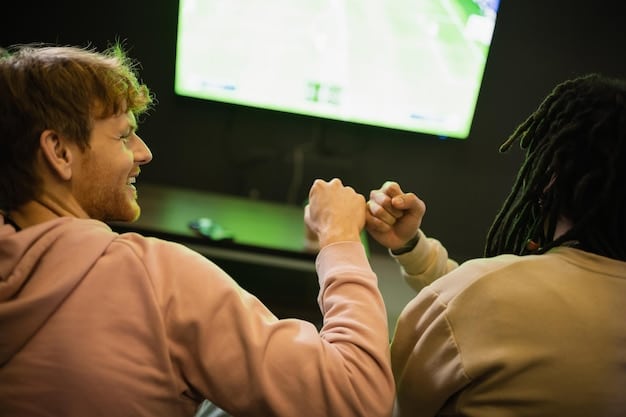
Creating Inclusive Spaces in League of Legends
Creating inclusive spaces within League of Legends is vital for ensuring that LGBTQ+ gamers feel welcomed, respected, and safe. This involves active effort from both players and the game’s developers.
Inclusive spaces are characterized by a culture of respect, acceptance, and support. These spaces should be free from harassment, discrimination, and prejudice, allowing individuals to express themselves authentically without fear of judgment. By prioritizing inclusivity, we can foster a more positive gaming experience for everyone.
Promoting Allyship
Allyship involves non-LGBTQ+ players actively supporting and advocating for LGBTQ+ gamers. This can include speaking out against discriminatory behavior, using inclusive language, and promoting LGBTQ+ visibility.
Implementing Inclusive Policies
Game developers can play a critical role in creating inclusive spaces by implementing policies that prohibit harassment and discrimination based on sexual orientation and gender identity. These policies should be clearly communicated and consistently enforced.
- Allyship provides support to LGBTQ+ gamers.
- Developers should implement inclusive policies.
- Inclusive language can create a sense of belonging.
By actively promoting allyship and implementing inclusive policies, we can work towards creating a more welcoming and supportive environment for LGBTQ+ gamers in League of Legends. It’s about fostering a culture where everyone feels valued and respected.
The Role of Game Developers in Supporting LGBTQ+ Gamers
Game developers have a significant role to play in supporting LGBTQ+ gamers and fostering inclusivity within their games. This involves more than just implementing policies; it requires actively incorporating LGBTQ+ representation and perspectives into the game itself.
By developing characters and storylines that reflect the diversity of the LGBTQ+ community, game developers can provide validation and visibility for LGBTQ+ gamers. Additionally, they can use their platform to promote awareness and understanding of LGBTQ+ issues, contributing to a more inclusive gaming culture.
Including LGBTQ+ Characters and Storylines
Ensuring representation of LGBTQ+ characters and storylines in games can foster a sense of belonging and validation for LGBTQ+ players.
Taking Action Against Harassment and Discrimination
Game developers must take swift and decisive action against harassment and discrimination targeting LGBTQ+ players. This involves implementing reporting mechanisms and enforcing penalties for abusive behavior.
- Characters matter, so include LGBTQ+ stories.
- Take down harassment!
- Promote positive messaging.
Their efforts contribute to a more inclusive and welcoming gaming environment for everyone.
Resources and Support for LGBTQ+ Gamers
For LGBTQ+ gamers seeking support and community, there are several valuable resources available online and within the gaming world. These resources can provide a safe space to connect with others, share experiences, and access information about LGBTQ+ issues.
These resources offer valuable support networks and educational materials, helping to foster a sense of belonging and empowerment. Taking advantage of these resources can be an important step in creating a positive and inclusive gaming experience for LGBTQ+ individuals.
Online Communities
Online communities such as Discord servers, Reddit groups, and LGBTQ+ gaming organizations offer a space for LGBTQ+ gamers to connect, share experiences, and find support.
Mental Health Resources
Mental health resources specifically tailored to the LGBTQ+ community can provide valuable support for individuals facing discrimination, harassment, or other challenges related to their identity.
- Discord and groups provide social connection.
- Mental health resources provide care.
- Knowing help exists is empowering.
By connecting with online communities and accessing mental health resources, LGBTQ+ gamers can find the support and empowerment they need to thrive confidently.
| Key Point | Brief Description |
|---|---|
| ❤️ Representation | Including LGBTQ+ characters fosters belonging. |
| 🛡️ Allyship | Supportive players defend LGBTQ+ gamers. |
| 🚫 Debunking Myths | Challenge stereotypes which harm LGBTQ+ gamers. |
| 🎮 Safe Spaces | Create harassment-free zones for inclusivity. |
Frequently Asked Questions
▼
Representation provides visibility and validation for LGBTQ+ players, fostering a sense of belonging and challenging societal norms within the gaming community.
▼
You can be an ally by using inclusive language, speaking out against harassment, defending LGBTQ+ players, and actively supporting LGBTQ+ initiatives within the gaming community.
▼
Common stereotypes include assumptions about playstyles, skill levels, and character choices based on sexual orientation or gender identity, which are baseless and harmful.
▼
Online communities, mental health resources, and LGBTQ+ gaming organizations offer spaces for connection, support, and access to mental health services tailored to the LGBTQ+ community.
▼
Developers can promote inclusivity by featuring LGBTQ+ characters and storylines, implementing policies against harassment and discrimination, and fostering positive messaging and representation throughout their games.
Conclusion
Debunking myths and stereotypes about LGBTQ+ gamers in the League of Legends community is essential for fostering a more inclusive and welcoming environment for everyone. By challenging misconceptions, actively practicing allyship, and supporting LGBTQ+ representation, we can create a gaming community where all players feel valued, respected, and safe.

